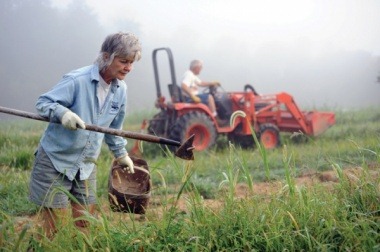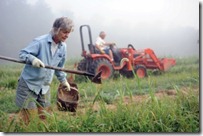There’s no Aruba, Barbados or Maui for this bunch.
A modern farmer’s life still portends grueling hours, endless chores and plenty of sweat, especially in the sweltering summertime when many of us head for the mountains or the beach.
Yet six local farmers insist that they wouldn’t have it any other way.
“We don’t really take vacations,” says Teresa Biagi, of Hazelfield Farm in Owen County, Ky. “There is no place we would rather be.”
Each of the farmers speak about being driven by the desire for fresh, unadulterated vegetables, self-sustainability and being close to nature. They find joy in handling the moist, rich soil and in nurturing tiny seeds that grow into fruits which, in turn, provide nourishment. As one farmer put it, farming is a lifestyle, not a job.
And as consumers increasingly look for fresh, local produce, farmers markets have proliferated, giving the farmer an ideal setting in which to sell their bounty.
Whether the farmer works the land full-time or has a day job and farms after-hours, Herculean best describes the level of work involved.
“It takes commitment and persistence, creativity and ingenuity, a whole host of skills, a can-do attitude and a never-give-up mentality,” says Jeff Ashba, of the Organic Farm at Bear Creek, in Clermont County.
The farmers agree that the rewards of working in nature far outweigh the sacrifices.
“It is an honor to spend our time outside working and learning from Mother Nature,” says Sarah Mancino, who with husband Adam, owns Farm Beach Bethel in Bethel, Ohio.
The couple and their children, Abraham and Ella, work the farm year-round.
“The farm doesn’t take a vacation or spring break,” Sarah adds, “and it doesn’t know when it is somebody’s birthday or Christmas.”
After organizing the farm work for the day, having breakfast and completing homeschooling, instrument practice and a family meeting, the Mancino crew (Adam also works at Whole Foods Market to help support the family finances) spends the day seeding or transplanting seeds into the field. By 3 p.m., they break for reading and a meal and then return to farm tasks until dark. In the busy market season, the entire day can be spent harvesting and preparing for market. Occasionally, the family gets a mini-vacation — a long summer weekend of pitching tents and sleeping outside.
Working equally vigorously are Sandra and Jeff Ashba, owners of Bear Creek Organic Farm, with their son, daughter-in-law and 2-year old grandson. All four Ashbas have demanding day jobs, and the vacation time they accrue goes toward working the farm.
“Others travel far distances and spend big bucks to take vacations to do what we do daily on the farm,” Jeff says, “including communing with nature, hiking, roaming through woods and relaxing by a sparkling cool stream.”
They begin the vegetable and herb growing season in February by planting tomato, pepper and other vegetables in a seed room. From April to May, the field is prepped. In May and June, greens, potatoes, onions and beets go in the ground. Harvesting season is July through October, after which the fields are cleaned up and the winter cover crop is planted. There are also year-long tasks such as processing and delivering products and maintaining equipment and facilities.
“We each have our favorite things to do,” Jeff says, “but you can’t be a farmer if you aren’t multi-talented and multitasking.”
Maple Grove Farm’s Dan Berger, a seasoned farmer and maple syrup guru, wonders if he is insane to do as much as he does, sometimes working four or five consecutive 16-hour days. Along with making maple syrup, he holds two jobs, full-time as a professional chef and part-time as a cooking instructor.
Although his method of maple syrup production involves “more physical labor than anyone can imagine,” Berger simply loves it.
“There aren’t any negatives to it, just some challenges and disappointments,” Berger adds. “When you have more than 100 buckets to collect, it’s getting dark, it’s 32 degrees outside, the wind is blowing sleet in your face and you can’t feel your fingers, that’s when it’s time to just tough it up.”
He plods on with his work, thinking of the lovely dinner awaiting him.
Unlike the other farmers, he can take breaks in the summer but never during the rigorous 16-hour-day maple season which starts in January with cleaning, assembling and preparing equipment. By the end of the month, he’s ready to tap. Syrup is produced from February to mid March, and then it’s time to clean the equipment and cut and split firewood for the next season.
At the Thistlehair Farm in rural Boone County, Ky., where Vicky Tewes and her family cultivate “certified naturally grown” produce, the demanding four-season work schedule is also the norm. A typical day starts at sunrise with harvesting tender greens, weeding, tying up plants, pruning, again harvesting, replanting and liberally watering the crops.
“We farm because we love it,” Vicky says. “It is our being.” There’s rarely time for a vacation during the growing season, but the Tewes sometimes plan a get-away during the colder months to attend organic conferences.
Also a year-round family operation is Hazelfield Farm, operated by wife and husband Teresa Biagi and Raphe Ellis, their daughter Esmee McKee, her husband Todd Elliott and baby Miller and daughter Sayward Samper with her child Kannon. The farming season lasts from February’s seeding to December’s holiday greenery preparation.
“It doesn’t bother us not to get away,” Biagi says. “We all like to work, especially outside — it keeps us healthy and happy.”
On a typical day the crew feeds chickens and donkeys, checks on cattle and milks the Jersey cow — all before breakfast. Then friends and family members arrive to help cut flowers, pick vegetables, plant, weed, mulch, water, arrange flowers, pack for market, put up hay, move the cows to new pastures, deliver flowers and anything else that needs to be done.
After dinner at 3 p.m., it’s back to work until dark sets in.
Melinda O’Briant, head grower at Turner Farm in Indian Hill, typically works 12 months a year and 50 hours a week in the summer. Only recently has she been able to take a summer vacation because of her assistant filling in for her. Turner Farm, owned by Bonnie Mitsui, is a model of small-scale organic farming techniques using draft animals and following low-impact sustainable methods.
O’Briant calls farming “work with a purpose.” Most people aren’t aware how much knowledge it takes to be good at farming. “That’s one reason I like it so much,” she adds. “There’s always more to learn.”
Farming also appeals to her competitive nature — she enjoys trying to have the earliest tomato, the prettiest flowers or the sweetest carrots.
In January, O’Briant orders seeds and supplies, plots the garden map and fills out paperwork for organic certification. In February, seed starting begins, and the farming continues through October, when Turner Farm gives pumpkin patch tours, plants garlic and covers winter crops.
On a typical summer day, she and her crew harvest baby lettuce and other greens in the morning and later squash, okra, beans, tomatoes and whatever else is in season. In the late afternoon they harvest flowers. There’s no set quitting time.
“Our souls are fed daily by the visual wonder,” Berger says. “We relish the smells, the rhythm of the seasons, and just being outside working in the fresh air.”
Despite the grueling work and long hours, most of the farmers agree: What work could provide better benefits than the beauty of the mornings, improving the planet through sustainable farming and feeling one with nature.
http://www.citybeat.com/cincinnati/article-23956-farming-makes-a-comeback.html


Deprecated: strpos(): Passing null to parameter #1 ($haystack) of type string is deprecated in /home/agriviek8Qv/agriviet.net/public_html/wp-includes/comment-template.php on line 2522